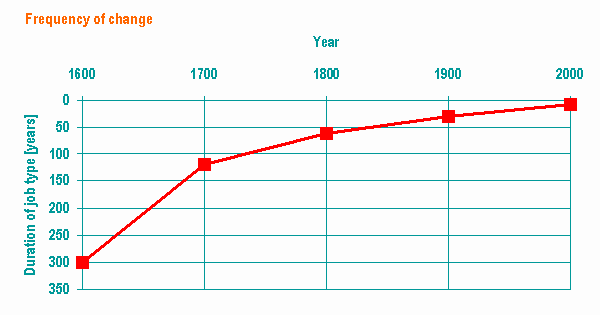by Paul Horsley.
- Introduction
- What brings about the need for change?
- The increasing need for change
- Why is there resistance to change?
- Personal
experience
- Managing
change
- Communication
- Confidence
in management
- Summary
What brings about the need for change?
|
Top |

|
It's not just the whim of the boss....... |
-
Doing your best is not enough!
Effort needs to be guided in the
right direction and regretfully that direction changes periodically.
Quality leadership can play an important role here.
Anticipation of customer wants!
The
increasing need for change
|
Top |
The rate of change is increasing
in terms of:-
 |
Volume |
 |
Momentum |
 |
Complexity |
|
1970 |
Managers' Prediction
of change. |
1990 |
|
60% |
No Change |
1% |
|
35% |
Sporadic, incremental |
24% |
|
5% |
Continuous, overlapping |
75% |
 |
Change is a new thing ! |
 |
Ever increasing need for change. |

- In the 1600 & 1700’s
jobs were handed down within families - a family might have done
one job for 300 years, i.e. farmer, stonemason, etc.
- In the 1800’s a person would
have a job for life, often depending on their background and
wealth. I.e. servant, mine worker, etc.
- In the early 1900’s education
and industrial development allowed people to move jobs but most
companies survived many years. I.e. cotton mills, steelworks,
etc.
- More recently, on average the
life of a Company today is much shorter which results in more
career changes.
- labour moves around….
- Traditionally businesses used
planned production levels and relied on sales teams who sold
what ever was produced.
- There were jobs for life.
- NOT NOW! - It is now market led.
Why
is there resistance to change?
Resistance to change is a pure PEOPLE
PROBLEM.
The organisation dictates the need
for change.
 |
Change, by definition takes something
(accustomed) away.
People don't like having things
taken away. Good or Bad.
This resistance is natural. (some
people may lose their jobs) |
|
Change, by definition introduces
something else. (usually new and unknown).
Workers don't know if they can
do the new job but know they can do what they have been doing.
We can all be expected to be apprehensive
towards the future, it's unknown ! |
 |
Peter Senge said "People don't
resist change. They resist being changed !
|
Its painful ! (hence the resistance).
We should all expect change to
be thrust upon us at sometime. |
 |
- Allow time to:-

|
Educate. |
 |
Listen. |
 |
Monitor. |
 |
Communicate. |
Lead
- make it happen - don’t dither.


- Don't forget, the need to change
and expect the fundamental resistance.
- Planning is essential.
- Set out the objective and the
route of how to get there.
- Plan who is to be told what and
when - anticipate the outcome / consequences.
- Expect high emotional stress which
will need dealing with, with sensitivity.
- Look for the natural 'traits'
in workers when allocating the need tasks - take advantage of
what's naturally if your favour.

|
Use the right channels for Communications
at the correct time. |
 |
Communicate the need and benefits
of change, |
 |
Send out the right messages
- morale. |
 |
Educate - explain that business
success depends on change. |

Confidence
in management.
|
Top |

|
Followers follow if they trust
the leader. |
 |
Leaders need to know the workforce,
and the workforce know the leader(s). |
 |
Leaders should show honesty,
openness. |
 |
Communicate - it is a 2 way
process - listen. |
 |
Understanding, and give reassurance. |
-

|
Provide a solid foundation. |
|
We all want to be behind
the winner (not the looser). |

|
Changes in personel make
management and effective leadership diffecult. i.e. It is difficult
for new managers who have not had opportunity to build up respect
and understanding.
- If managed; change is good (essential
to survive)!
- Change can be managed only by
communicating;
- (Remind everyone repeatedly of
its necesity and positives it brings).
- If directors ensure that their
managers and workforce are clear about the direction the organisasion
it to go in (and the reasoning) a united team effort to make
the necessary change should prevail.

- Change is an understandable and
predictable process - the possibility of this foresight needs
to be utilised.
- Effective strategies and plans
are required to optimise the benefits of change and minimise
the problems.
- Everyone's approach to change
is the all important factor:-
- pro-active = architect
- reactive = victim.










